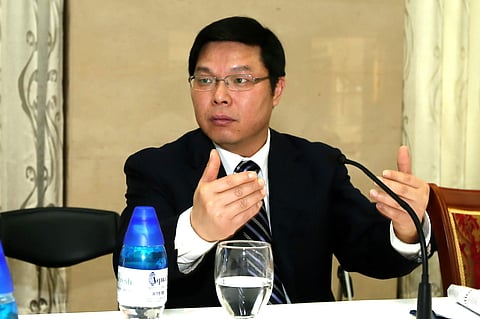

COLOMBO: China’s Ambassador in Sri Lanka, Yi Xianliang, says that outside forces and domestic political considerations may have brought about the temporary suspension of China-funded and executed projects in Sri Lanka when the Sirisena-Wickremesinghe government came into being in 2015.
Speaking to Bandula Jayasekara in Maharaja TV’s morning program Pethikada on Friday, Ambassador Yi did not elaborate on the theme of “outside forces” (suspected to be India and the US) but chose to focus on the domestic issues which were raised during and after the January 8 Presidential election which led to the replacement of a China-friendly Mahinda Rajapaksa regime by a pro-West Sirisena-Wickremesinghe government.
Ambassador Yi said that main issue in Sri Lanka was the environmental impact of the ambitious US$ 1.4 billion China-funded and executed Colombo Port City Project. Yi maintained that in his view as an environmental lawyer, the project was no threat to the environment.
“I went through all the documents relating to the environmental assessment of the project as an environmental lawyer myself, and had found that there was no problem.” He said.
The Port City Project is good Sri Lanka, Yi said and expressed happiness that work on it has resumed .But he regretted that about 5,000 Sri Lankan workers had to be laid off for more than a year owning to the suspension.
The Ambassador then went on to warn that suspension of foreign investments in this way would adversely affect the inflow of FDIs into Sri Lanka. Asked what kind of investment China could bring to Sri Lanka, Yi said that given the right conditions, China could being into the Hambantota Economic Zone alone US$ 5 billion in the next three years.
For China, business in a goal, but promotion of good relations with the people and government of Sri Lanka is no less important, Yi said. And relations have been good ever since Sri Lanka became independent in 1948, and a “new China” emerged in 1949, he pointed out.
Yi kept stressing the point that China’s relations with Sri Lanka is not tied to a particular leader or political party. Beijing’s relations are with the government and the people of Sri Lanka irrespective of the party or leader in power, he said.
Yi pointed that despite election time propaganda against Chinese projects in Sri Lanka, and the subsequent suspension of mega projects like Colombo Port City, China’s President Xi Jinping had invited Sri Lankan President Maithripala Sirisena to visit China. Subsequently, Prime Minister Ranil Wickremesinghe and other ministers visited China to discuss economic matters. China had hosted 30 MPs of all Sri Lankan political parties and the Speaker of parliament.
In Yi’s view (despite the recent hiccups over the Port City Projects and the interest rates charged by China), relations between the two countries have only gone from strength. China has been a genuine friend right through, unreservedly supporting Sri Lanka in international forums, he pointed out.